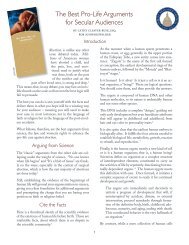The Effects of Divorce on Children - Family Research Council
The Effects of Divorce on Children - Family Research Council
The Effects of Divorce on Children - Family Research Council
Create successful ePaper yourself
Turn your PDF publications into a flip-book with our unique Google optimized e-Paper software.
divorce will exhibit more anxiety and depressi<strong>on</strong> and antisocial behavior than<br />
children from intact families. 83<br />
<strong>Children</strong> who experience divorce at any age will c<strong>on</strong>tinue to be affected their<br />
whole lives, tending to “exhibit higher malaise scores at age 33 than their<br />
c<strong>on</strong>temporaries whose parents remained married.” 84<br />
Behavioral Problems. <strong>Children</strong> <str<strong>on</strong>g>of</str<strong>on</strong>g> divorced or separated parents exhibit<br />
increased behavioral problems, 85 and the marital c<strong>on</strong>flict that accompanies<br />
parents’ divorce places the child’s social competence at risk. Even in intact<br />
families that have low to medium levels <str<strong>on</strong>g>of</str<strong>on</strong>g> c<strong>on</strong>flict, children still have “fewer<br />
behavior problems than those in the high-c<strong>on</strong>flict, disrupted families.” 86 Another<br />
study suggests that parental c<strong>on</strong>flict affects the outcomes <str<strong>on</strong>g>of</str<strong>on</strong>g> children’s behavior<br />
problems, regardless <str<strong>on</strong>g>of</str<strong>on</strong>g> parents’ marital status, and sometimes “there is no<br />
statistical difference in the level <str<strong>on</strong>g>of</str<strong>on</strong>g> behavior problems observed for children whose<br />
parents separated or divorced and for children whose parents remained<br />
together.” 87<br />
During a divorce, c<strong>on</strong>flict between parents is <str<strong>on</strong>g>of</str<strong>on</strong>g>ten accompanied by less affecti<strong>on</strong>,<br />
less resp<strong>on</strong>siveness, and more inclinati<strong>on</strong> to punish their children, which leaves<br />
their children feeling emoti<strong>on</strong>ally insecure. 88 <str<strong>on</strong>g>The</str<strong>on</strong>g>se children are more likely to<br />
perceive their social milieu as unpredictable and unc<strong>on</strong>trollable. 89 <strong>Children</strong> who<br />
engage in fighting and stealing at school are far more likely to come from broken<br />
homes than are well-behaved children. 90 Other studies have c<strong>on</strong>firmed that<br />
children <str<strong>on</strong>g>of</str<strong>on</strong>g> divorced parents exhibit more behavioral problems than do children<br />
83<br />
Lisa Strohschein, “Parental <str<strong>on</strong>g>Divorce</str<strong>on</strong>g> and Child Mental Health Trajectories,” Journal <str<strong>on</strong>g>of</str<strong>on</strong>g> Marriage<br />
and <strong>Family</strong> 67 (2005): 1286.<br />
84<br />
Frank F. Furstenberg and Kathleen E. Kiernan, “Delayed Parental <str<strong>on</strong>g>Divorce</str<strong>on</strong>g>: How Much Do<br />
<strong>Children</strong> Benefit?” Journal <str<strong>on</strong>g>of</str<strong>on</strong>g> Marriage and <strong>Family</strong> 63 (2001): 452.<br />
85<br />
D<strong>on</strong>na Ruane Morris<strong>on</strong> and Mary Jo Coiro, “Parental C<strong>on</strong>flict and Marital Disrupti<strong>on</strong>: Do<br />
<strong>Children</strong> Benefit When High-C<strong>on</strong>flict Marriages Are Dissolved?” Journal <str<strong>on</strong>g>of</str<strong>on</strong>g> Marriage and the<br />
<strong>Family</strong> 61 (1999): 626.<br />
86<br />
D<strong>on</strong>na Ruane Morris<strong>on</strong> and Mary Jo Coiro, “Parental C<strong>on</strong>flict and Marital Disrupti<strong>on</strong>: Do<br />
<strong>Children</strong> Benefit When High-C<strong>on</strong>flict Marriages Are Dissolved?” Journal <str<strong>on</strong>g>of</str<strong>on</strong>g> Marriage and the<br />
<strong>Family</strong> 61 (1999): 634.<br />
87<br />
D<strong>on</strong>na Ruane Morris<strong>on</strong> and Mary Jo Coiro, “Parental C<strong>on</strong>flict and Marital Disrupti<strong>on</strong>: Do<br />
<strong>Children</strong> Benefit When High-C<strong>on</strong>flict Marriages Are Dissolved?” Journal <str<strong>on</strong>g>of</str<strong>on</strong>g> Marriage and the<br />
<strong>Family</strong> 61 (1999): 632.<br />
88<br />
Patrick T. Davies and E. Mark Cummings, “Marital c<strong>on</strong>flict and child adjustment: An<br />
emoti<strong>on</strong>al security hypothesis,” Psychological Bulletin 116 (1994): 387-411. As cited in Paul R.<br />
Amato and Alan Booth, A Generati<strong>on</strong> at Risk, (Cambridge, MA: Harvard University Press,<br />
1997), 137.<br />
89<br />
Paul R. Amato, <strong>Children</strong> in Australian Families: <str<strong>on</strong>g>The</str<strong>on</strong>g> Growth <str<strong>on</strong>g>of</str<strong>on</strong>g> Competence, (Sydney:<br />
Prentice Hall <str<strong>on</strong>g>of</str<strong>on</strong>g> Australia, 1987). As cited in Paul R. Amato and Alan Booth, A Generati<strong>on</strong> at<br />
Risk, (Cambridge, MA: Harvard University Press, 1997), 137.<br />
90<br />
Rex Forehand, “<strong>Family</strong> Characteristics <str<strong>on</strong>g>of</str<strong>on</strong>g> Adolescents Who Display Overt and Covert Behavior<br />
Problems,” Journal <str<strong>on</strong>g>of</str<strong>on</strong>g> Behavior <str<strong>on</strong>g>The</str<strong>on</strong>g>rapy and Experimental Psychiatry 18 (1987): 325-328.<br />
13




